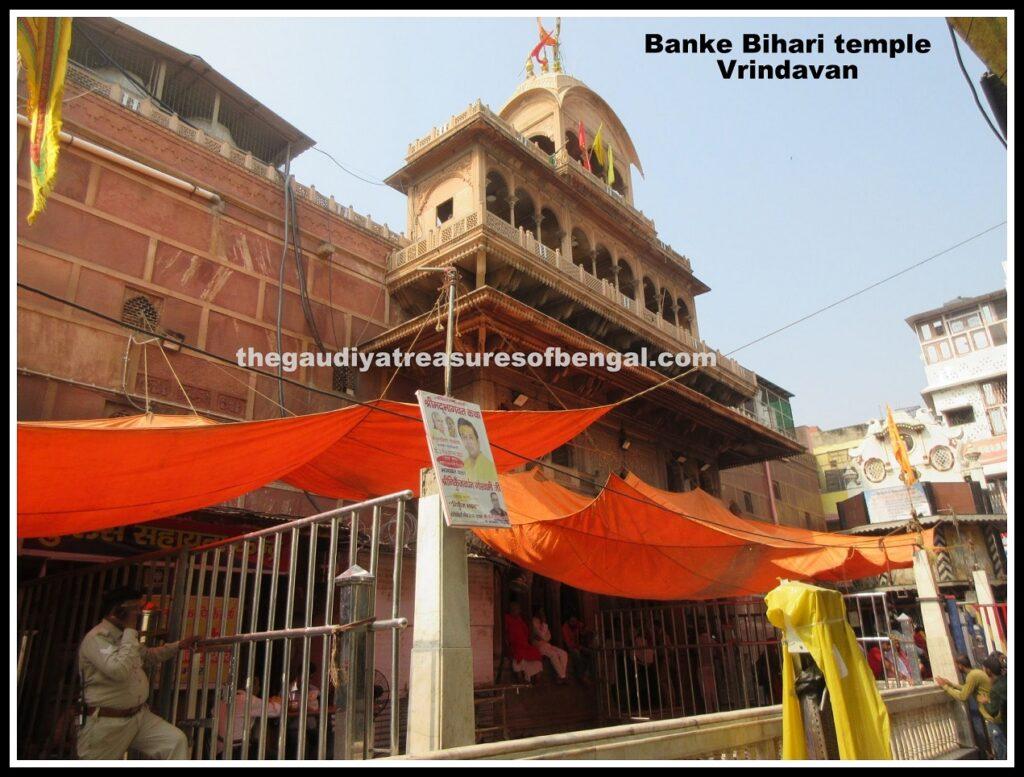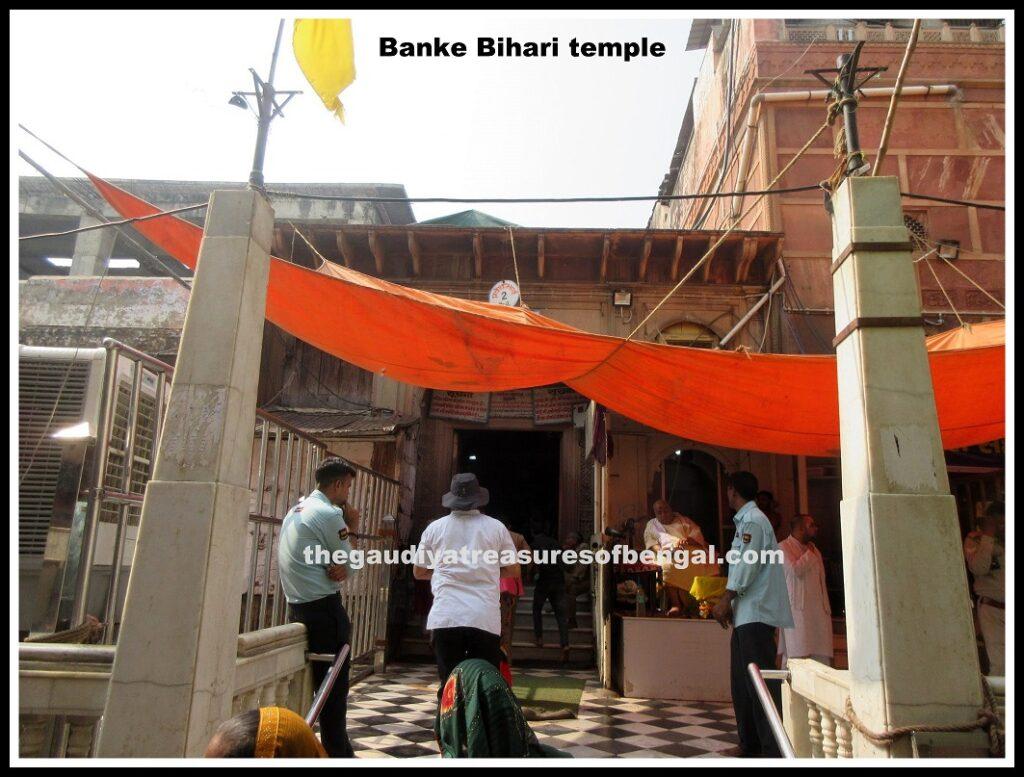 As I made my way through the crowded streets of Vrindavan, my heart was filled with excitement and anticipation. I was on my way to the Banke Bihari Temple, one of the most revered and ancient temples in India. As I entered the temple, I was struck by the beauty of its architecture, with intricate carvings and vibrant colors adorning every inch of the walls. The air was thick with the fragrance of incense and the sound of devotees chanting and singing hymns.
As I made my way through the crowded streets of Vrindavan, my heart was filled with excitement and anticipation. I was on my way to the Banke Bihari Temple, one of the most revered and ancient temples in India. As I entered the temple, I was struck by the beauty of its architecture, with intricate carvings and vibrant colors adorning every inch of the walls. The air was thick with the fragrance of incense and the sound of devotees chanting and singing hymns.
As I made my way towards the main deity, Lord Banke Bihari, I was surprised to see that there were no bells ringing. Instead, the temple was filled with the sound of clapping, as devotees expressed their love and devotion to the deity in a unique and lively way. The sight of Lord Banke Bihari (Krishna), adorned with flowers and jewels, was simply mesmerizing. I was able to feel a sense of complete and utter spiritual ecstasy. The Banke Bihari Temple is not just a temple, but a spiritual experience that has been cherished by devotees for centuries. In this article, we will explore the history and significance of the Banke Bihari Temple and learn about the unique traditions and customs that are observed here. So come, let us immerse ourselves in the world of devotion and spirituality as we embark on a journey to the Banke Bihari Temple.
Banke Bihari ji and Swami Haridas
In the ancient and holy town of Vrindavan, there lived a great saint named Swami Haridas Ji, who was a devoted worshiper of Lord Krishna and Radharani. It is said that he was the reincarnation of Lalita Sakhi, one of the closest confidantes of Sri Radha and Krishna. One day, as Swami Haridas was lost in his intense devotion, Lord Krishna and Srimati Radharani appeared in person in Nidhivan, where he used to perform his daily bhajan. The divine couple’s beauty and charm were so overwhelming that the mortal beings, who were the disciples of Swami Haridas, were unable to bear it. Seeing this, the swami requested Sri Radha-Krishna to take a unified form that would be easier for his disciples to behold. He asked them to merge into a single black charming idol like a cloud (ghan) and lightning (damini).

The Lord and his beloved obliged their devotee’s request and merged into a single form known as Banke Bihari ji, who is worshiped even today in the Banke Bihari temple. Swami Haridas used to sing divine and soulful bhajans for the pleasure of the Lord and wanted to have the darshan of Srimati Radharani and Lord Krishna together in combined (yugal) form. Since the divine couple reciprocates as per the desire of the devotee, they mercifully merged together in the tribhanga form and appeared before Swami Haridas as the deity of Banke Bihari Ji. From that time until 1862, the deity of Banke Bihari Ji was venerated in the same place in Nidhivan, until the Goswami family who served Him decided to construct the magnificent Banke Bihari Ji Mandir that stands today.
Tansen, the famous musician and poet, and one of the nine navratanas in Akbar’s court, was a disciple of Swami Haridas. Tansen learned music and devotion from Swami Haridas in the early part of his life. After hearing about Swami Haridas from Tansen, Akbar had an inner calling to listen to the transcendental voice and music of Swami Haridas. But Swami Haridas didn’t sing for anybody except the Lord. Akbar came with Tansen and was hiding in a bush while Swami Haridas was singing for the Lordships. He was so moved that he went to him and fell at his feet. The resting place of Swami Haridas is at Nidhivan, and as one enters Nidhivan, the first small temple that comes in the way is the samadhi of Swami Haridas, where he used to reside and do his bhajan. It is the same place where the deity of Banke Bihari Ji appeared before him.
Today, the Banke Bihari Temple is a place of great spiritual significance and attracts devotees from all over the world who come to witness the divine beauty of Lord Krishna and Radharani in their yugal form. The temple’s architecture bears the influence of the Rajasthani style, with magnificence added by the arches and pillars. The temple’s rich history and unique traditions continue to enchant and inspire devotees to this day.
Meaning of Banke Bihari
The word “Banke” in Hindi carries a profound meaning – it refers to the unique pose in which the deity of Banke Bihari Ji is sculpted, a pose known as “tribhanga.” This pose is characterized by three graceful bends, creating a mesmerizing curvature at the head (or neck), waist, and legs (or knees).
In this enchanting tribhanga posture, Lord Krishna stands with divine elegance, playing his melodious flute, while Srimati Radharani, the epitome of divine love, gently rests her head upon Krishna’s left shoulder. The intertwining of their celestial forms represents the eternal bond between the divine couple, captivating the hearts of devotees who witness their divine union.
The name “Bihari” holds its own significance, signifying Krishna’s joyful pastimes and blissful wanderings amidst the enchanting groves (kunj) of Vrindavan. In these groves, Krishna, along with Radharani, surrounded by the gopis and sakhis, indulges in various enchanting divine plays (lilas) that are savored and cherished by all. This association with the blissful groves of Vrindavan grants Krishna the endearing title of “Kunj-Bihari,” the one who revels in the blissful abode of kunj.
Thus, the name “Banke Bihari” encompasses the divine grace of Lord Krishna in his tribhanga pose and the joyous essence of his playful exploits in the groves of Vrindavan. It is a name that resonates with love, devotion, and the eternal bond between the divine couple, inviting devotees to immerse themselves in the divine ecstasy of their divine pastimes.
Interesting Facts about Banke Bihari Temple
In the temple of Banke Bihari Ji, there is a unique tradition where no bells are rung. Swami Haridas, who used to serve the deity, treated Him like an eight-year-old child and believed that ringing bells would disturb Him. Furthermore, there is no mangal darshan, or morning viewing, as devotees believe that Thakur Ji (Krishna) should not be disturbed from his morning sleep after Rasa dance with gopis all night.
The flute of Banke Bihari Ji is played only once a year, on the eve of Sharad Purnima. Additionally, the darshan of His Lotus Feet is only available on Aksaya Tritiya.
The presiding deity, Sri Bankey Bihari Ji, is intermittently hidden from view by a curtain. This is because it is said that if a devotee looks into the eyes of the Lord for too long, they may lose consciousness due to His exceptional charm and beauty. This interrupted darshan is a unique aspect of the Banke Bihari temple and adds to its allure for devotees.
How to Reach
To reach Banke Bihari temple in Vrindavan, one can follow these steps:
- By air: The nearest airport is the Indira Gandhi International Airport in New Delhi, which is about 150 km away from Vrindavan. From there, you can take a taxi or a bus to reach Vrindavan.
- By train: Vrindavan has its own railway station called Vrindavan Railway Station. It is well-connected to major cities in India such as Delhi, Agra, and Mathura. You can take a train to Vrindavan and then take a rickshaw or a taxi to reach the temple.
- By road: Vrindavan is well-connected to major cities in India by road. You can take a bus or a taxi from Delhi or Agra to reach Vrindavan.
Once you reach Vrindavan, you can easily find a rickshaw or a taxi to take you to the Banke Bihari temple, which is located in the heart of Vrindavan. It is advisable to wear appropriate clothing and footwear as the temple area can be crowded and uneven.